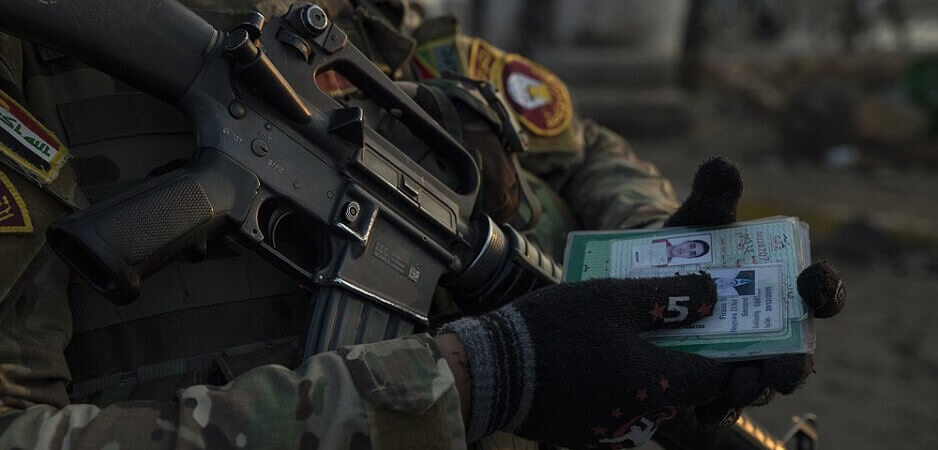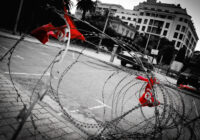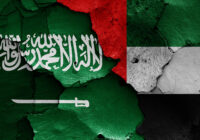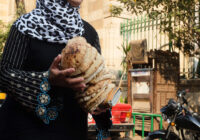Iraq is a country that has not seen peace for decades. Instability will stay even after the Islamic State is defeated. [Click the image above or scroll down to view mini gallery.]
Iraq’s short window of recovery from the US-led invasion in 2003 was slammed shut in 2014 after the Islamic State (IS) overran the country through acts of terror. The devastating consequences have left more than 3 million internally displaced persons (IDP), according to the United Nations High Commissioner for Refugees (UNHCR).
As it moved full speed back into Iraq from neighboring Syria, the Islamic State’s prize capture was Mosul, which is the second largest city in the country. This only strengthened the group’s presence and increased the threat of its expansion in Iraq. The leader of IS, Abu Bakr al-Baghdadi, has kept the group functioning with financial contributions from the Gulf and stolen oil revenue, as well as extortion, taxation and the sale of antiquities.
With most areas of Iraq liberated from IS control, the final stage to free Mosul from the terrorist organization began in October 2016 and continues to the present day. In the early stages of the Mosul operation, IS set the profitable Qayyarah oil fields near Mosul aflame. This desperate attempt to stop the advance of coalition forces affected IS profits.
Since October, the Iraqi army—which is backed by American military, Kurdish Peshmerga forces, Shia militia and other groups in Iraq—has been aggressively sweeping IS from Mosul. The Islamic State is losing the battle to the coalition’s offensive. This is resulting in the depletion of salaries for IS militants inside the city. The remaining militants have chosen new tactics to survive by shaving their beards hoping to blend in with civilians. The loss of salaries has caused militants to exchange hostages for large ransoms to keep IS operations alive in Mosul.
Though eastern Mosul was declared fully liberated by Iraqi Prime Minister Haider al-Abadi on January 24, the city is still booby trapped. Remaining IS snipers and improvised explosive devices (IED) planted throughout the city have made Mosul a maze of threats.
RETURNING HOME
With the liberation of each neighborhood, droves of civilians leave the camps and return home despite the danger. Yet some residents are apprehensive about returning to a destroyed city that is still plagued by instability and the threat of IS sleeper cells.
Abdullah, a civilian in Mosul whose infant daughter was born in Khazer refugee camp, doesn’t have a home because IS destroyed it. He echoes the thoughts and experiences of the city’s internally displaced population.
“I don’t want to return to Mosul, there is no safety there,” he says. “I want to go to Turkey or Germany, my brother is there.”
For nearly two years, the voices of residents trapped inside eastern Mosul were silenced, with many choosing to spend most of their time indoors instead of being harassed by IS militants in the street. In contrast, western Mosul is still under IS control, though a coalition offensive began on February 19. According to the UNHCR, “over 50,000 persons have reportedly been displaced since the beginning of operations in west Mosul.”
Those who were able to escape western Mosul describe a situation where children are being used as informants, and doctors are forced to work for IS or risking losing their homes or lives. According to a UN report, the situation is creating a lack of affordable food and clean water.
The liberated areas of Mosul, which are predominantly populated by Sunni Muslims, have a persistent quietness to them. Despite this, people scurry in markets and Humvees patrol to keep the areas in check.
In al-Sukar, a neighborhood in eastern Mosul, a man who did not want to be named was distraught when IS was referred to as the “Islamic State.”
“Don’t call this Islam, this is not Islam,” he says. “Islam is innocent from what they are doing. What they are doing is 100% opposite [of] what Islam says. Even you can’t call them a terrorist group because they are more destructive and evil than terrorist groups.”
IS attempts to run its own form of government include taking over the education system in cities under its control. The president of the student union of Mosul University, Ahmed Alrashidi, expressed his thoughts about the group’s influence on the population.
“The fighters of ISIS [Islamic State] might be killed, but the mind of ISIS in the people has been left behind,” he mentions.
The effect of IS beyond education has extended to the creation of barbaric courts used for public torture and civilian homes confiscated and turned into prisons.
In 2015, the UN declared that IS militants may have committed war crimes, crimes against humanity and genocide—primarily for targeting minority groups such as the Yazidi community who mostly reside in northern Iraq. Christians and Yazidis have inhabited Iraq for centuries, making the country a diverse population. The Islamic State’s forced conversions, mass executions, torture and slavery are common strategies used by the group for implementing control.
The purge of IS militants from Iraq continues, but the impact they have left is evident from the lives and infrastructure they have destroyed. Iraq is a country that has not seen peace for decades. The continuation of war plagues the nation. It is evident that the extremism IS has left behind in Iraq may continue into the future, even after the final liberation of Mosul.
The views expressed in this article are the author’s own and do not necessarily reflect Fair Observer’s editorial policy.
Photo Credit: Bethanie Mitchell
Support Fair Observer
We rely on your support for our independence, diversity and quality.
For more than 10 years, Fair Observer has been free, fair and independent. No billionaire owns us, no advertisers control us. We are a reader-supported nonprofit. Unlike many other publications, we keep our content free for readers regardless of where they live or whether they can afford to pay. We have no paywalls and no ads.
In the post-truth era of fake news, echo chambers and filter bubbles, we publish a plurality of perspectives from around the world. Anyone can publish with us, but everyone goes through a rigorous editorial process. So, you get fact-checked, well-reasoned content instead of noise.
We publish 2,500+ voices from 90+ countries. We also conduct education and training programs
on subjects ranging from digital media and journalism to writing and critical thinking. This
doesn’t come cheap. Servers, editors, trainers and web developers cost
money.
Please consider supporting us on a regular basis as a recurring donor or a
sustaining member.
Will you support FO’s journalism?
We rely on your support for our independence, diversity and quality.






